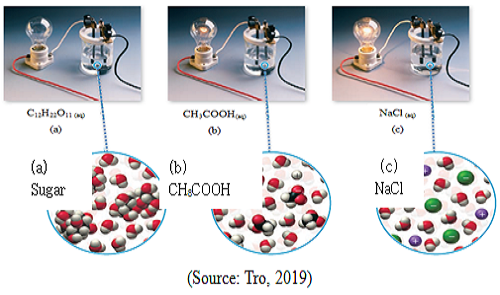
Development Of A Flipped Classroom Learning System Based On Guided Inquiry On Electrolyte And Non-Electrolyte Solution Materials
Abstract
The era of education influenced by the industrial revolution 4.0 is called Education 4.0. Education 4.0 is an education that is characterized by the use of digital technology in the learning Therefore, research is needed that aims to develop a guided inquiry-based flipped classroom learning system using Moodle on electrolyte and non-electrolyte solutions, as well as to determine the level of validity and practicality of the products developed. This type of research is Educational Design Research (EDR) using the Plomp model. The subjects of this study were 3 chemistry lecturers at FMIPA UNP, 3 chemistry teachers, and 15 students in class XI IPA SMAN 8 Padang. This research was conducted to test the validity using the Aiken's V formula and the practicality test using the percentage formula. Five validators carried out the validity test and one-to-one evaluation by three students. The results of processing the validity test data are 0.88, indicating the valid category. For the data processing results, the practicality test for students is 88%, and the practicality test for teachers is 94% which shows the very practical category.
Keywords
Full Text:
PDFReferences
Aiken, L. R. (1985). Three coefficients for analyzing the reliability and validity of ratings. Educational and psychological measurement, 45(1), 131-142.
Anggraeni, C. W. (2018). Promoting Education 4.0 in English for Survival Class: What are the Challenges?. Metathesis: journal of English language, literature, and teaching, 2(1), 12-24.
Arianti, V. A., & Zainul, R. (2020). Development of E-Module Based On Discovery Learning On Topic Of Electrolyte and Non-Electrolyte Solutions For Grade X SMA or MA. Edukimia, 2(2), 79-84.
Asra, A., Latisma, L. D., & Mawardi, M. (2016). Peningkatan Aktivitas, Motivasi, Dan Hasil Belajar Siswa Dengan Pendekatan Inkuiri Terbimbing Di Sma Negeri 8 Padang. Eksakta, 1, 75-81.
Aumi, V., & Mawardi, M. (2021). Validity And Practicity Of Flipped Guided Inquiry Based Learning (FGIL) Model In Chemical Kinetics For Year 1 Students. International Journal of Progressive Sciences and Technologies (IJPSAT), 26(2), 142-147.
Barringer, M.-D., Pohlman, C., & Robinson, M. (2010). Schools For All Kinds Of Minds: Boosting Student Success By Embracing Learning Variation. John Wiley & Sons.
Brady, J. E., Jespersen, N. D., & Hyslop, A. (2012). Chemistry The Molecular Nature of Matter. Edisi Keenam. Wiley & Sons. Inc.
Chaeruman, U. A. (2013). Merancang Model Blended Learning Designing Blended Learning Model. Jurnal Teknodik, 053-063.
Chang, R. dan Overby, J. (2011). General Chemistry The Essential Concepts 6th Edition. New York: The Mc Graw Hill Companies.
Fani, V. G., & Mawardi, M. (2022). Flipped classroom learning system based on guided inquiry using moodle on acid-base solutions. Jurnal Pijar Mipa, 17(3), 361-368.
Gaja, M. R., & Mawardi, M. (2021). Sistem Pembelajaran Flipped Classroom Berbasis Inkuiri Terbimbing Pada Materi Larutan Elektrolit dan Larutan Nonelektrolit untuk Siswa Kelas X SMA/MA. Jurnal Pendidikan Tambusai, 5(2).
Hanson, D. (2005). Process-Oriented Guided-Inquiry Learning, Faculty Guidedbook-A Comprehensive Tool for Improving Faculty Performance (Ed), 2th Edition. Pasific Cres.
Handhika, J. (2010). Pembelajaran Fisika Melalui Inkuiri Terbimbing Dengan Metode Eksperimen Dan Demonstrasi Ditinjau Dari Aktivitas Dan Perhatian Mahasiswa1. Jurnal Penelitian Pembelajaran Fisika, 1(1).
Ismail, I. A., & Mawardi, M. (2021). Flipped Classroom Learning System Guided Inquiry On Thermochemical Materials For High School Students Class XI. International Journal of Progressive Sciences and Technologies (IJPSAT), 30(1), 280-287.
Jannah, M. (2012). Pengembangan perangkat pembelajaran berorientasi nilai karakter melalui inkuiri terbimbing materi cahaya pada siswa kelas VIII sekolah menengah pertama. Journal of Innovative Science Education, 1(1).
Maulida, U. (2020). Konsep Blended Learning Berbasis Edmodo Di Era New Normal. Dirasah: Jurnal Pemikiran dan Pendidikan Dasar Islam, 3(2), 121-136.
Mursid, R., & Yulia, E. (2019). Pengembangan pembelajaran dalam teknologi pendidikan di era ri 4.0.
Ninda, A., & Mawardi, M. (2022). Validity and Practicality of Flipped Classroom Based on Guided Inquiry on Reaction Rate Material. Entalpi Pendidikan Kimia, 3(2), 15-20.
Overmyer, G. R. (2014). The flipped classroom model for college algebra: Effects on student achievement (Doctoral dissertation, Colorado State University).
Pahrudin, A. (2019). Buku: Pendekatan Saintifik Dalam Implementasi Kurikulum 2013 Dan Dampaknya Terhadap Kualitas Proses Dan Hasil Pembelajaran Pada Man Di Provinsi Lampung.
Plomp, T., & Nieveen, N. (2007). An Introduction to Educational Design Research. Proceedings of the Seminar Conducted at the East China Normal University, Shanghai (PR China), November 23-26.
Prakoso, K. S. (2005). Membangun E-learning dengan Moodle. Yogyakarta: Andi.
Purwanto. (2010). Evaluasi Hasil Belajar. Yogyakarta: Pustaka Pelajar.
Rizkivany, L. & Mawardi, M. (2021). The Development of Flipped-Guided Inquiry Based Learning System on Redox and Electrochemical Reactions for Class XII SMA. International Journal of Progressive Sciences and Technologies, 27(1), 382-387.
Sari, M. U., & Mawardi, M. (2022). Development of a Guided Inquiry-Based Moodle E-Learning System on the Topic of Salt Hydrolysis. Jurnal Pendidikan MIPA, 23(1), 244-255.
Surjono, H. D. (2010). Membangun course e-learning berbasis moodle. Universitas Negeri Yogyakarta.
Tro, N. J. (2018). Chemistry in focus: A molecular view of our world. Cengage Learning.
Tro, N. J. (2019). Chemistry, A Molecular Approach.
Waer, W. P., & Mawardi, M. (2021). Integrasi model inkuiri terbimbing dan pendekatan flipped classroom pada pembelajaran materi sifat koligatif larutan untuk siswa kelas XII SMA/MA. Edukatif: Jurnal Ilmu Pendidikan, 3(3), 1029-1037.
Yulietri, F., & Mulyoto, M. (2015). Model Flipped Classroom dan Discovery Learning Pengaruhnya Terhadap Prestasi Belajar Matematika Ditinjau Dari Kemandirian Belajar. Teknodika, 13(2).
Yunus, Y., & Sardiwan, M. (2018). Perancangan dan Pembuatan Media Pembelajaran Berbasis Android pada Mata Pelajaran Sistem Komputer. Jurnal Pti (Pendidikan Dan Teknologi Informasi) Fakultas Keguruan Ilmu Pendidikan Universita Putra Indonesia" Yptk" Padang, 31-41.
DOI: http://dx.doi.org/10.31258/jes.6.4.p.538-549
Refbacks
- There are currently no refbacks.
Copyright (c) 2022 Miftah Alfidyah, Mawardi Mawardi

This work is licensed under a Creative Commons Attribution 4.0 International License.
Publisher: FKIP Universitas Riau












